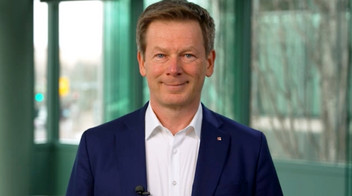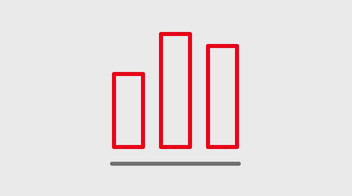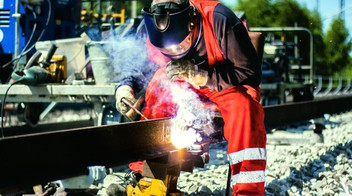Greenhouse gas intensity
The share of renewable energies in the DB traction current mix in Germany is not the only measure by which we manage our progress in climate protection. We also track the development of our specific greenhouse gas emissions in comparison to 2006.
Specific CO₂e emissions in comparison to 2006 / % | 2023 | 2022 | 2021 |
DB Group | –40.1 | –42.1 | –36.1 |
Excluding fleet vehicles, DB Schenker stationary divisions, and individual divisions of DB Cargo.
Excluding USA Truck.
In line with our climate protection target for 2023, we are slightly below the previous year’s figure in reducing our specific greenhouse gas emissions, but are within the scope of our forecast from the 2022 Integrated Report. The decline is mainly due to the deterioration in the greenhouse gas intensity in the 16.7 Hz traction current as a result of deterioration in the public electricity mix.
Specific CO₂e emissions from DB Group journeys and transport | 2023 | 2022 | Change | 2021 | |
absolute | % | ||||
Regional rail passenger transport (g/pkm) | 46.1 | 46.9 | –0.8 | –1.7 | 76.5 |
thereof in Germany | 44.1 | 44.9 | –0.8 | –1.8 | 74.1 |
Long-distance rail passenger transport (g/pkm) | 0.6 | 0.9 | –0.3 | –33.3 | 1.4 |
Bus transport (g/pkm) | 68.1 | 75.5 | –7.4 | –9.8 | 100.4 |
thereof in Germany | 93.8 | 110.5 | –16.7 | –15.1 | 117.2 |
Rail freight transport 1) (g/tkm) | 18.4 | 15.9 | +2.5 | +15.7 | 17.2 |
thereof in Germany | 20.1 | 14.5 | +5.6 | +38.6 | 16.2 |
Road freight transport 2) (g/tkm) | 81.7 | 80.6 | +1.1 | +1.4 | 82.0 |
Air freight 3) (g/tkm) | 674.2 | 666.9 | +7.3 | +1.1 | 657.3 |
Ocean freight 3) (g/tkm) | 5.7 | 5.7 | – | – | 5.5 |
Well-to-wheel (WTW); Scope 1 –3; rail transport companies are taken into account with their own electricity mix or their respective national mixes. Includes DB Arriva.
1) In 2021, rail freight transport from/to China by DB Cargo and DB Schenker may have included double accounting, and so these values may be slightly higher.
2) Excluding USA Truck.
3) Excluding pre-carriage and on-carriage.
An important lever for becoming climate-neutral by 2040 is the diesel phase-out. To this end, we are using an approach that is open to all technologies with alternative fuels and drives.
In addition to the diesel phase-out, we are greening the heat supply in order to achieve climate neutrality. At the end of their life cycle, we are gradually replacing heating systems operated with fossil fuels with climate-friendly alternatives. In 2022, energy supply concepts were created for the top 50 DB Group sites in Germany. In addition, energy supply concepts were created for another 50 priority sites in 2023. The results are incorporated into specific phase-out plans and the respective sites are now gradually being re-equipped accordingly.


